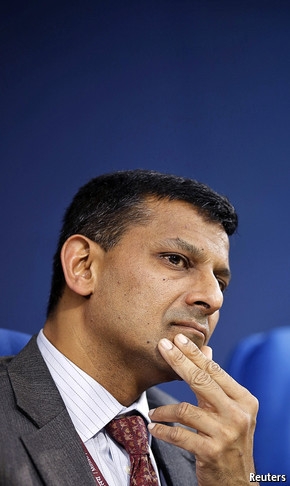(单词翻译:单击)
Raghuram Rajan joins the RBI
Raghuram Rajan加入印度储备银行
Out of the frying pan
脱离苦海
A star economist is put in charge of India’s central bank
明星经济学家接手印度央行
Aug 10th 2013 | MUMBAI |From the print edition
RAGHURAM RAJAN is often described as one of the few economists to predict the financial crisis. In a speech in 2005 to the world’s top central bankers he said innovation had made finance more dangerous. At the time his view was dismissed by Larry Summers, now a front-runner to become chairman of the Federal Reserve (see article), as “slightly Luddite”.
Raghuram Rajan经常被说成是少数几个预测到金融危机的经济学家之一。2005年一次向世界顶级央行银行家的演讲中,他说道创新让金融业更危险。当时,Larry Summers并没有理会他的观点,说他有点卢德分子的感觉,恐惧技术变革。现在Larry Summers是美联储主席的热门人选。

Mr Rajan has also been right about India. In 2010, as hubris in the country soared, he warned that “growth can never be taken for granted” and that “self-delusion is the first step towards disaster.” As he prepares to succeed Duvvuri Subbarao at the helm of the Reserve Bank of India (RBI) in September that caution seems prescient. India’s economy is in a funk and it faces a balance-of-payments scare. The rupee has fallen by 12% against the dollar in the past three months.
Mr Rajan’s appointment, announced on August 6th, is welcome. As well as a stint as chief economist for the IMF and a star turn in academia, he has spent the past year advising the finance ministry and has been involved in efforts to get India’s reforms back on track (with mixed results). He believes in liberalisation, which India needs lots more of.
Rajan先生对印度的观点也是正确的。2010年,印度国内风气十分傲慢,他警告说任何增长都不是理所当然的,自欺是灾难的开始。现在他准备九月份从Duvvuri Subbarao手中接过印度储备银行,这意味着之前的警告是对的。印度经济处于恐惧之中,面临达不到收支平衡的恐惧。过去的三个月,卢布对美元汇率下跌了12%。Rajan先生的任命在8月6号宣布,广受欢迎。作为国际货币基金组织的首席经济学家,同样也是学术界的名宿,他过去一直致力于给印度财政部提供建议,努力使印度改革回到正轨(改革结果各异)。他相信自由经济主义,这正是印度所需。
Yet his is an unenviable task. To stabilise the currency the RBI recently introduced a package of measures to suck liquidity out of the banking system and in turn raise short-term market interest rates (the RBI’s benchmark rate was unchanged). This seems to be working but may cause a credit crunch among firms and banks, pushing GDP growth below the present 4-5% rate. India’s position is better than some critics allow: relative to its GDP it has a moderate amount of foreign debt to refinance. Still, for now the RBI must choose between a currency slump or strangling the economy.
然而他的任务艰巨。为了稳定货币,印度储备银行最近引入了一揽子措施减弱银行系统的流动性,提高了短期市场利率(印度储备银行的基准利率没变)。这些措施有所成效,但是可能会在公司和银行之间引起信贷危机,使GDP增长低于现在的4-5%。印度的处境比批评家们所说的要好,与GDP相关的是印度有一定数量的外债来进行再融资。就现在而言,印度储备银行要么选择货币暴跌,要么选择经济崩溃。
In the long run the solution is a big burst of government reforms that would restore confidence among foreign and domestic investors. But with an election due by May 2014, that looks unlikely. In the meantime, Mr Rajan will have to face other problems. India’s state banks are sitting on a pile of bad debts. The RBI’s recent decision, in principle, to allow India’s business houses to set up their own banks is also a headache. Mr Rajan is a critic of cronyism but he will have his work cut out to prevent licences going to well-connected tycoons.
长期的解决方案是政府改革的大爆发会重树国内外投资者的信心。但是随着2014年5月大选即将到来,这看起来是不可能的。同时,Rajan先生将不得不面对其他问题。印度的国有银行坏账成灾。原则上讲,印度储备银行决定允许印度企业建立自己的银行也很让人头痛。Rajan先生反对任人唯亲,但是如果他阻止向商业大亨们发放许可证可能会丢掉自己的官位。
Mr Rajan is no administrator but will also have to reform the RBI. It is a fine institution, but a stretched one. In the 1990s it toyed with relinquishing some of its vast empire—it runs everything from monetary policy to public-debt issuance and bank regulation. Recently it has clung to its powers only to find that its multiple goals of stability, growth and low inflation conflict. Mr Rajan’s task is to resolve those contradictions. If he succeeds, Western central bankers, who have seen a proliferation in their responsibilities since the crisis, will have another reason to listen to his views.
Rajan先生不是行政官,但是他也会改革印度储备银行。该银行是一个不错的机构,但是显得有点捉襟见肘。1990年代,它很随便的放弃了自己的一些业务,当时可是一个大型金融王朝,拥有从货币政策到过国债发放和银行监管等业务。最近,印度储备银行收紧权力却发现稳定,增长与低通货之间冲突不断。Rajan先生的任务是解决这些矛盾。如果他成功了,那么西方的央行银行家会因此而选择听听他的观点,自从金融危机之后,这些银行家就看到了他们责任有所增加。


